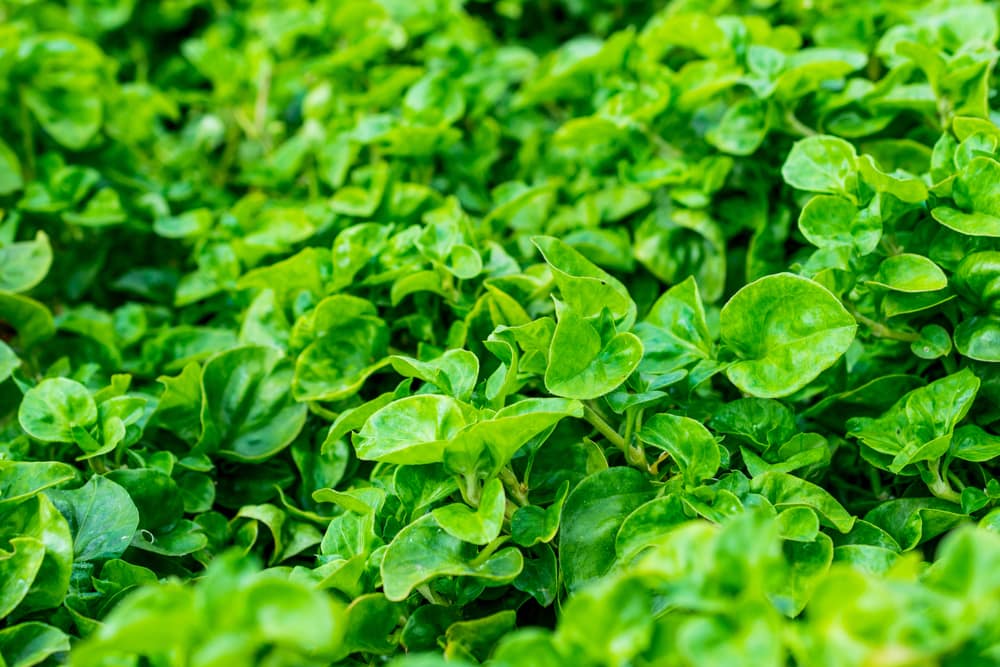How to Bond With Your Guinea Pig – 20 Easy Tips

Updated on
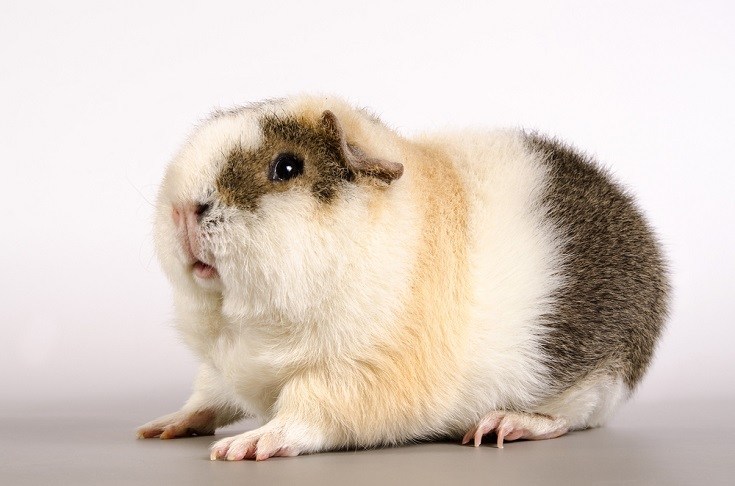
Guinea pigs are super friendly but can be incredibly nervous. Once you’ve befriended them, they’re more than happy to cuddle with you, but until you’ve earned their trust, expect to see a few dashes for safety.
Fortunately, guinea pigs can bond just as strongly with their owners as they do with their guinea pig friends. You can nurture this bond with a few nifty tricks, from spending time with your pet to giving them tasty snacks. This list of 20 tips for bonding with your guinea pig is a good place to start.
The 20 Tips for Bonding With Your Guinea Pig
1. Be Consistent
Guinea pigs depend on routine just as much as cats and dogs do. You can help develop the bond between you by being as consistent as possible. A good routine includes feeding your guinea pig at the same time every day and giving them frequent chances to get out of their cage. Regular grooming sessions should be included too.
While you might not always be able to feed them on time or give them a chance to run around, you should do your best to stick with the routine that you’ve created.
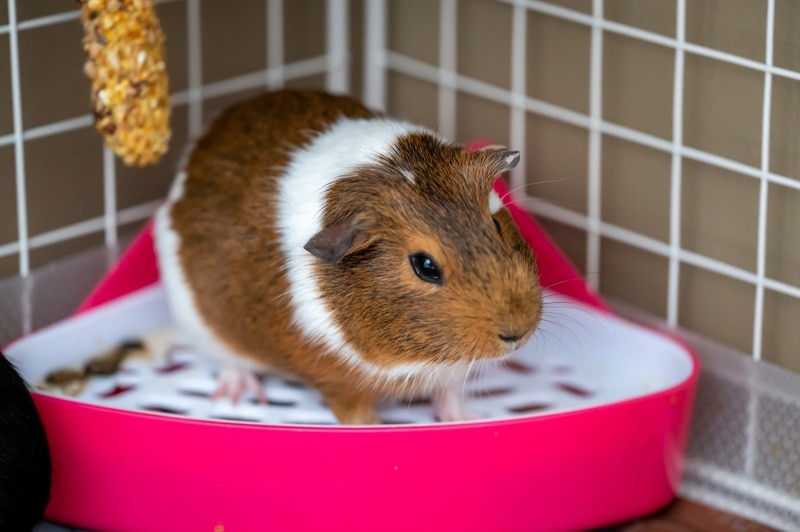
2. Be Gentle
An effective way of building a bond with your guinea pig is to show them that you’re trustworthy. Guinea pigs are prey animals and will only open up to you if they know that you won’t hurt them. This means being gentle in all your interactions with them, whether you’re petting or feeding them, cleaning out their cage, or simply talking to them through the bars.
As your guinea pig adjusts to their new home and your presence, your gentleness will prove to them that you can be trusted. While they might dart for cover to start with, over time, you’ll see them coming up to you instead.
3. Clean Their Cage
Your guinea pig relies on you for many things, and keeping their cage clean is important for their health and happiness. Guinea pigs love to be social and to have your attention, but they also appreciate being able to rest in fresh bedding once they’ve finished exploring.
They can’t clean out their cage themselves, nor can they ask you to do it for them, so you need to remember to make it part of your routine. Regularly cleaning out their cage will not only ensure that you remove all the soiled bedding and forgotten food, but it’s also a perfect opportunity to let your guinea pig explore outside their cage. Make sure you set up a playpen to keep them safe while you’re busy.
Thoroughly clean your guinea pig’s cage once a week or more often if it gets particularly mucky. This includes the hideouts, beds, and bowls.

4. Create a Safe Hideaway
No matter how safe your guinea pig’s cage is, there will come a time when something startles them enough that they want to hide. It might be the family dog peering in through the bars or the shrieking of overexcited children. Whatever the reason, your guinea pig will need somewhere safe and sheltered.
Make sure your guinea pig’s cage has a house of some kind for them to take refuge in if they need to. An overturned cardboard box will do in a pinch, but you can buy sturdier and more stylish options from your local pet store.
5. Have Floor Time
A secure playpen on the floor of your living room or even in the garden on sunny days is a fun way to give your guinea pig a break from their cage. Not only does it give you a chance to change the bedding and clean their toys, but it’s also a good way to keep them entertained by giving them somewhere new to explore.
You shouldn’t leave your guinea pig in their playpen all the time, but “floor time” should be a regular part of your guinea pig’s routine.

6. Give Them Time Outside
On sunny days, it’s nice to sit outside and enjoy the fresh air. You’re not the only one who thinks so. Guinea pigs love to munch on fresh grass, and it should be a big part of their diet to help their digestive system work correctly. Giving them a chance to explore a small patch of your garden allows them to graze to their heart’s content and enjoy the sunshine.
Make sure you have a secure, covered pen to keep your guinea pig in while they’re outside and check that there aren’t any lawnmower clippings lying about, as those could make them sick.
7. Hand Feed Treats to Them
If there’s one surefire way to your guinea pig’s heart, it’s through their stomach. Tasty treats are always fun for giving your guinea pig something different from their regular diet. Fresh vegetables will also give them a health boost. By hand-feeding treats to your guinea pig, you’ll be teaching them that you’re the one who supplies them with their favorite foods.
After a few hand-feeding sessions, your guinea pig will learn to associate you with tasty snacks and will be more than happy to say “hi” whenever you stop by their cage.
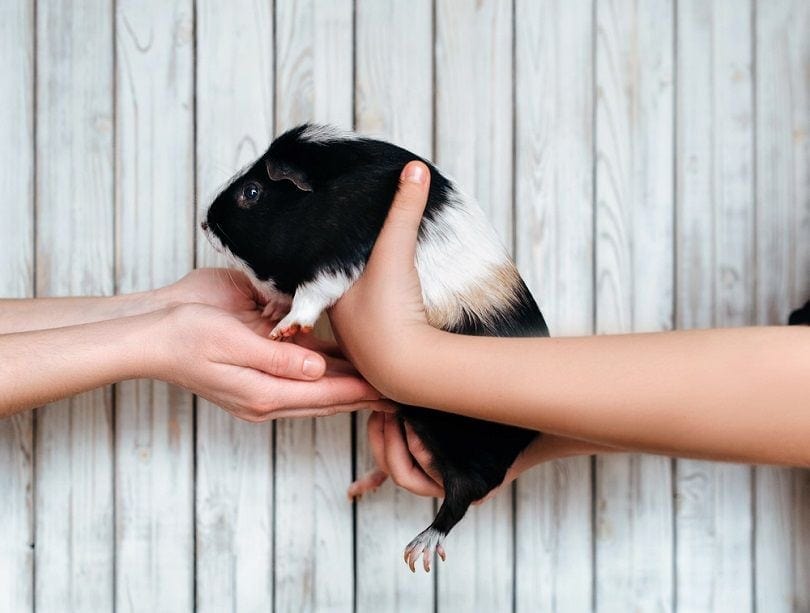
8. Have Patience
There is no shortcut when you’re building a bond with your guinea pig. While you can increase your chances of gaining their trust with these tips, it will still take time. Don’t get frustrated if it takes your guinea pig a few weeks to see you as someone safe.
Above all else, you need to be patient; don’t let your eagerness to cuddle with your guinea pig make you irritated when they’re slow to trust you. All good things come with time, and with dedicated effort, your guinea pig will soon be eager to spend time with you too.
9. Hold Them Correctly
Due to their size, delicate spine, and instinctive dislike of being picked up, your guinea pig can easily be accidentally hurt when you hold them. Part of keeping them safe means learning how to announce your intentions to your guinea pig and how to hold them correctly.
When you pick up your guinea pig, make sure they know you’re there. Don’t just lift them straight out of the cage from above. They are prey animals and will think that they’re being attacked. Instead, let them approach you and sniff your hands before you try to pet or hold them. When you do pick them up, place a hand under their chest, support their hindquarters, and hold them close.
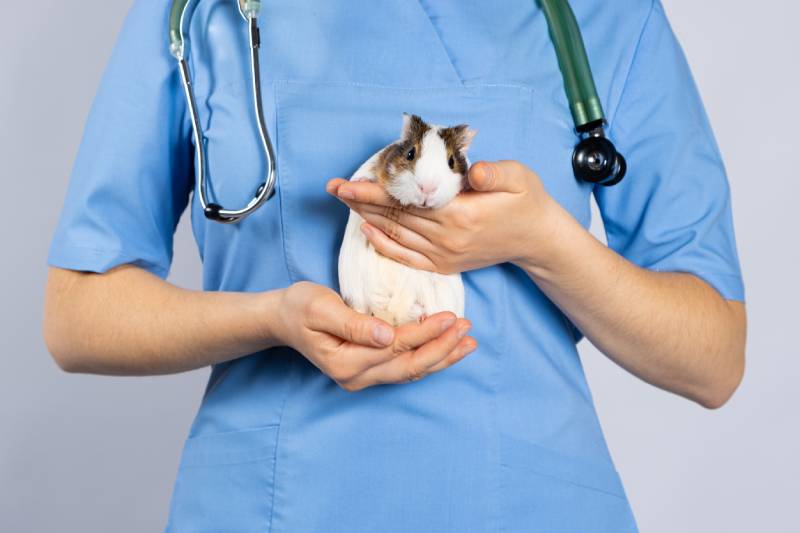
10. Know When to Take a Step Back
Once the bond between you and your guinea pig is strong enough, you’ll likely find that your guinea pig loves to cuddle. Even social animals need a break, though. Every so often, your guinea pig will appreciate a break from being picked up and pet. Also, holding them can increase the risk of them getting hurt. Recognizing when they want to be held and when they’d rather be left alone is vital.
If they appear to be distressed or frightened, it’s best to let them calm down first. The same can be said for if they’re sick, are recovering from an injury, or have just given birth. Generally, if your guinea pig is feeling vulnerable, they’ll find hiding preferable to socializing.
11. Make Sure the Cage Is Secure
Keeping your guinea pig safe means ensuring that their cage is as safe as possible. This goes for their playpen and outdoor run if they have one. If you have other pets, consider placing the cage high enough that the dog can’t get into it, or get one with a lid to prevent your cat from investigating. Providing your guinea pig with plenty of places to hide will also help.
Even if guinea pigs are your only pets, you still need to make sure their cage isn’t at risk of having things falling into it. It should also be placed on the floor or on a sturdy stand to make sure it won’t fall when your guinea pig decides to run around.
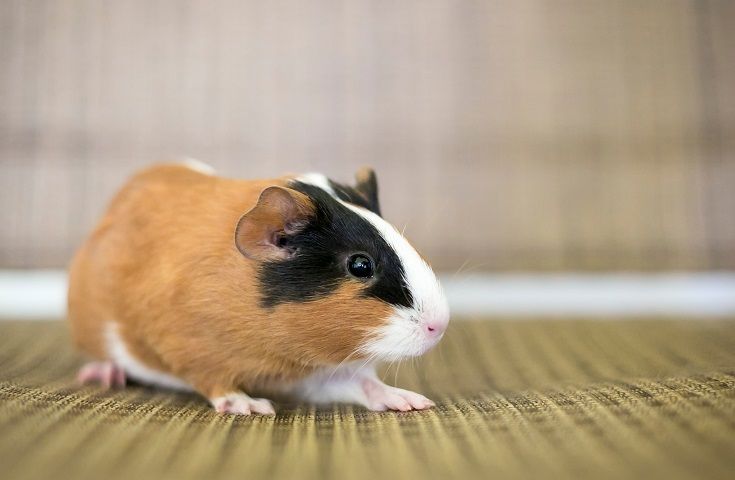
12. Never Yell at Your Guinea Pig
To your guinea pig, loud noises are rarely good things. They like to be quiet, and sudden or sharp noises will make them feel threatened. This can be a result of excited children playing by the cage or your audible irritation about your guinea pig chewing up your carpet if you let them out.
Unfortunately, your guinea pig won’t understand what they’ve done wrong if you yell at them. Your raised voice is more likely to scare them and damage the trust that you’ve built with them. Although some loud noises are unavoidable, do your best to avoid yelling or screaming around your guinea pig.
Even if they’re not the target of your frustration, they won’t be able to understand why you’re suddenly angry. It’s better for them if you remain calm and cheerful in all your interactions with them.
13. Pet Your Guinea Pig
Petting your guinea pig is one of the easiest ways to prove that you’re not going to hurt them. Take it slow, and don’t pressure them into accepting your touch. They might be too tired or wary to be comfortable.
Whenever you can, make sure you spend time petting your guinea pig every day. You can combine petting sessions with your guinea pig’s favorite treats to help them learn to look forward to being pet.
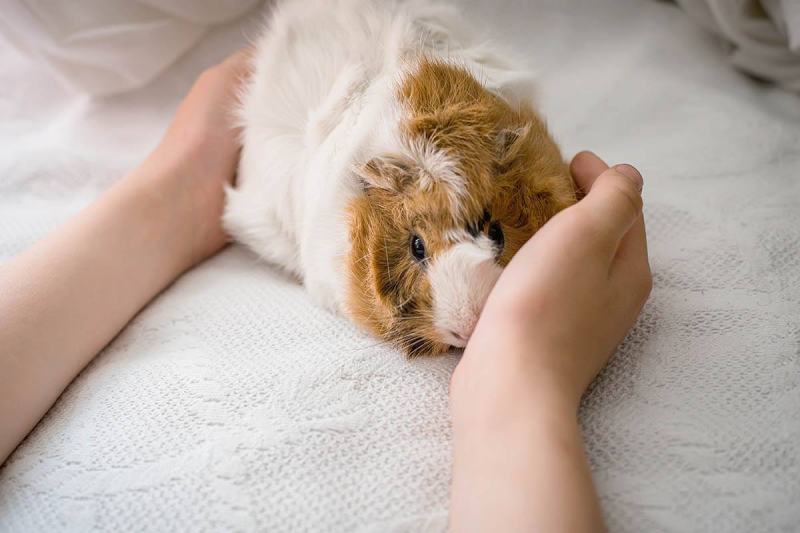
14. Play Together
Another fun way to build up the bond between you and your guinea pig is by playing with them. Whenever you let your guinea pig out of their cage, sit with them, and let them explore around you. Keep a few treats handy, and encourage them to play with their favorite toys.
You can also drape a blanket over your feet and ankles to create a tunnel. Entice your guinea pig to explore under the blanket, and don’t be surprised if they settle in for a nap against your foot once they know that it’s safe.
15. Provide Them With Plenty of Toys
While guinea pigs enjoy spending time with other guinea pigs and you, they need other ways of entertaining themselves. Make sure their cage has a few toys for them to play with and a tunnel or house for them to explore. Both will help prevent boredom, and the latter will give them somewhere to hide and a safe spot to sleep in.
Remember to move your guinea pig’s toys with them when you place them in their playpen, so they have something to do while they’re out of the cage.
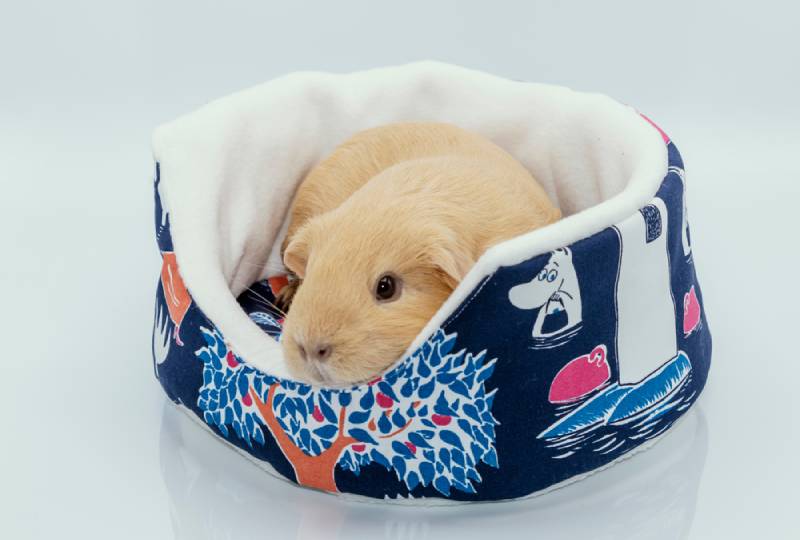
16. Do Regular Grooming Sessions
Whether you have a long- or short-haired guinea pig, you’ll need to groom them regularly. This serves two purposes. One, it gives you a chance to check for skin infections, parasites, or lumps that might require a visit to your veterinarian, and two, it enables you to spend time with your guinea pig.
Coat Care
For long-haired guinea pigs, you’ll need to brush them several times a week to prevent tangles, remove loose fur, and get rid of any debris that they might have caught in their coat. You can groom your short-haired guinea pig too, but you won’t need to do so as often.
You can bathe your guinea pig, but don’t submerge them in water or overdo their bath time. Most of the time, baths are only necessary if their fur becomes too clogged with urine or poop. Make sure you use specially formulated shampoo.
Nail and Tooth Care
Don’t forget to tend to their nails and teeth. You’ll need to trim your guinea pig’s claws at least once a month and monitor the growth of their teeth. While their teeth don’t need to be brushed, you need to make sure your guinea pig is eating plenty of hay to naturally wear down their teeth.
17. Spend Time With Your Guinea Pig
When you first get your guinea pig, they’ll be wary of you, their new guinea pig friends, and their cage. You shouldn’t push them to adjust too quickly by forcing cuddle time on them, but you can still get them used to your presence.
The easiest way to do this is by placing the cage somewhere you tend to spend time that isn’t loud—your home office, for example. If everywhere else is too noisy, take time to sit with your guinea pig wherever you put their cage.
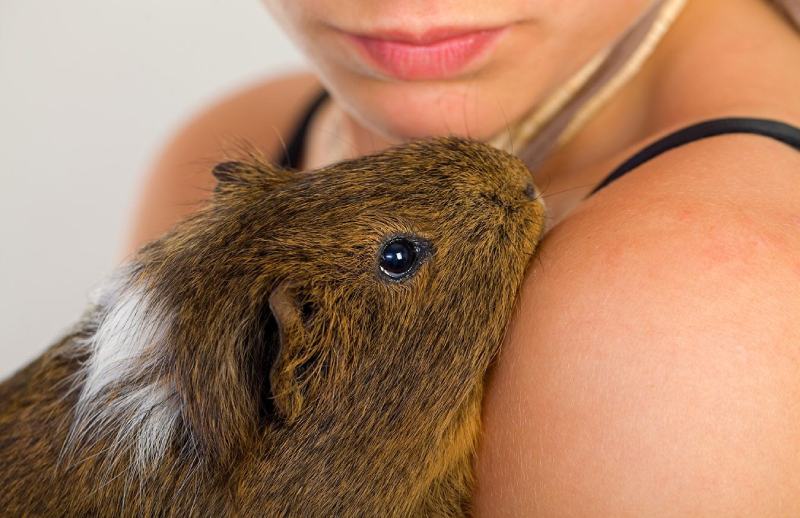
18. Supply Them With Fresh Water
Besides providing your guinea pig with a balanced diet, you’ll need to give them a supply of clean water. Their cage, playpen, and outdoor run should all have a water bottle within easy reach of your guinea pig, to keep them hydrated and healthy.
You can use the same bottle for all three areas, though you’ll need to remember to move it whenever you move your pet. Also, be sure to regularly clean the bottle and fill it with fresh water.
19. Talk to Them
Most people talk to their pets, guinea pigs included. Even when you’re not talking to them, your guinea pig is bound to hear your voice at some point. To avoid startling them and to teach them to associate your voice with you, make sure you talk to them regularly.
You can talk about anything with your guinea pig; just remember to keep your voice calm and gentle to avoid scaring them. Keep a few of your guinea pig’s favorite treats on hand too.
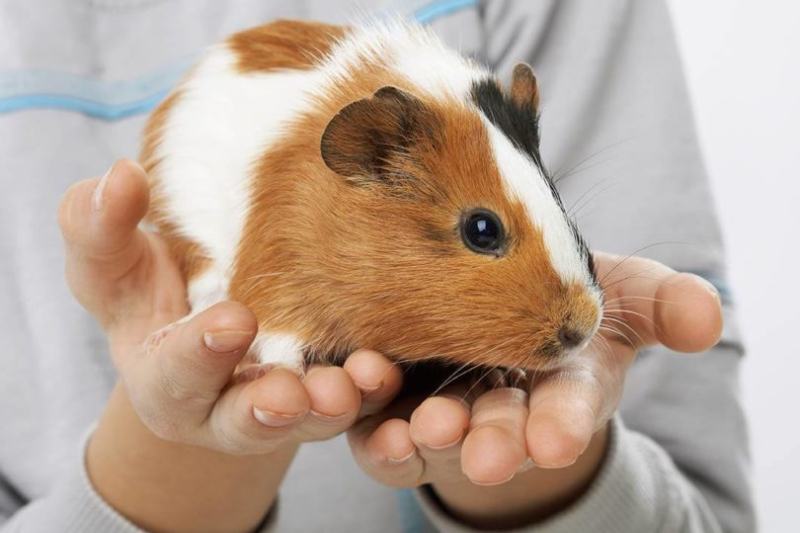
20. Teach Children How to Properly Treat Your Guinea Pig
Children are typically excited when it comes to animals, especially cuddly guinea pigs. While a happy toddler doesn’t mean to frighten your guinea pig, your pet won’t understand why there’s so much noise and movement around them.
To avoid scaring your guinea pig, you need to teach children—particularly when they’re young—how to approach a guinea pig calmly and hold them safely. Avoid letting kids interact with your guinea pig if they’re too excited, and always monitor their playtime together to make sure no one gets hurt.
Conclusion
Bonding with your guinea pig takes time and patience but is more than worth the effort. With time, your nervous guinea pig will soon be trundling up to you to sniff out snacks and enjoy a cuddle session or playtime. The key is being gentle and providing a safe and secure environment for your guinea pig to live in. A few tasty treats go a long way too!
- Related Read: How to Bathe Guinea Pigs: 14 Vet Approved Essential Tips
Featured Image Credit: Chorch, Shutterstock



